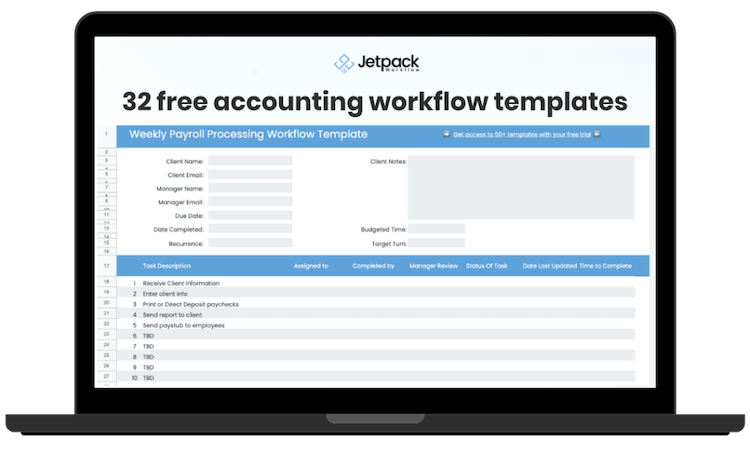10 Interesting and Lucrative Accounting Niches for 2024

Focusing on a specific niche can give you the edge you need, if you’re starting a new firm or trying to give your existing firm more direction.
This article will look at the benefits of having a specialized niche, how to determine which niche is right for your accounting practice, and 10 interesting niches for accounting firms.
The Advantages of Niching Down as an Accountant
Having a specific niche allows you and your firm to stand out from the competition in any field. With over 138,000 accounting firms in the US, how will you stand out from your competitors?
A niche allows you to envision your ideal customer and focus on finding them. A specialty helps your firm determine which specific services to offer and how to market those services.
By focusing on a single area, you can develop expertise that will increase your efficiency (therefore, your profitability) and allow you to provide better service to your clients.
7 Things to Look for When Choosing an Accounting Niche
Before getting into any specific niches, let’s cover a few things you want to consider as you analyze which ones might be the best fit for you:
- Growth: Finding a niche in its infancy is ideal. A new niche gives you the opportunity to become an expert in your specialty and distinguish yourself by staying abreast of trends, current news, and regulations. If it’s not a new niche, you want to find a growing niche. A growing industry means you’ll find ample opportunity to service new businesses that don’t have existing accounting support. Industries like restaurants and retail may not be growing exponentially but often have a significant number of new businesses opening each year.
- Profitable clients: To establish long-term relationships and minimize your client churn, you need to find profitable companies. Most startups don’t hit the ground running with positive cash flow. However, you’ll want to find a niche with the potential for profitability in the first few years. This will give you more time to handle your clients’ needs, and you’ll spend less time finding your next client.
- Recession resilient industries: You’ll want to find a niche that tends to perform well even in a slow economy, or you may lose clients when things are tough for everyone. Though no one can predict when the next recession will hit, you want to be prepared.
- An industry you’re interested in: Though this might be better listed as a nice-to-have, a passion for the industry you are serving can be helpful. Your clients will benefit from your knowledge and excitement for their field, and you will know you are supporting a business you care about. Spend time talking to your current clients about their work and find out which companies pique your interest.
- Matches your experience: If you have a background in another field, you can bring that knowledge to your accounting work. Additionally, if your accounting training is specific to certain types of accounting work (such as budgeting or auditing), you can find a field with a greater than average need for those services.
- Uniqueness: There are a lot of accountants who market themselves for various niches. Is there a niche that isn’t being serviced by anyone (or at least, no one is positioning themselves as an expert in that field?) Finding a unique niche allows you to focus your marketing which can minimize your marketing budget.
- Specificity: For an example in another industry, consider marketing yourself as a periodontal specialist instead of a dentistry specialist. When potential clients need an accountant, you’re more likely to be found if you serve a very specific niche and have a search engine optimization strategy in place for that specialty.

10 Interesting and Lucrative Accounting Niches
1. Real Estate
Though real estate is not a new field by any means, it’s still a lucrative field involving a large number of investors. Additionally, new investors are entering the industry in record numbers both as real estate investors and realtors. A record number of individuals secured their real estate licenses in 2021.
Short-term rentals continue to grow in popularity, which means a record number of people are running small hospitality businesses. These small business owners may be good at running their rentals but often need help when it comes to managing their accounting.
2. SaaS Startups
The Internet has become a part of our daily lives, and the need for software to service our various needs is growing. The software as a service (SaaS) industry grew by 11.7% in 2021 alone.
Many software companies are started by a single individual or small team of founders. Though they have a passion for programming and software, they often need assistance with money issues and don’t need full-time accounting staff. Offering fractional CFO services to software companies is a growing niche.
Additionally, software companies seeking outside funding need solid financial statements readily available and may need a financial representative to meet with investors. Because there are specialized accounting regulations regarding investments, this niche is perfect for someone looking to specialize.
3. Medical, Dental, and Law Firms
Though the number of independent practices in each of these fields has fallen over the past two decades, the number of people working as independent contractors in these fields has risen. Many of these high-earning independent contractors could benefit from forming an LLC or S-corporation, which comes with its own set of books and tax returns.
Though these fields and their required accounting are fairly similar, each specific specialty allows you to position yourself as the go-to accountant for that field. For example, you might market yourself as the accountant for radiologists or immunotherapy practices.
Sometimes niches grow organically when you meet one person in the field, and they refer coworkers to you for accounting services. This organic growth is especially likely in highly specialized fields where many of the professionals in the field trained together or still regularly consult each other.
Once you have a few professionals in a given specialty, you will have a good idea of the accounting pain points for their industry and can work on resolving those issues.
4. Construction
Construction is one of the few fields that has been (mostly) resistant to consolidation. Because building happens on small local or regional scales, many local firms require accounting and tax services.
Construction companies often require specialized assistance when allocating overhead expenses and ensuring they follow state labor laws when working with subcontractors.
Most construction firms and contractors don’t require full-time accounting support but would benefit from having an accountant on call to assist with their financial questions.
5. Restaurants
Though restaurants don’t meet all of the criteria outlined above for the best niches, the large number of restaurants can make it a lucrative niche.
To differentiate yourself in the marketplace, consider specializing in a specific type of restaurant or cuisine. Though the accounting doesn’t change between types of restaurants, it gives you a chance to stand out in the marketplace. Consider marketing yourself as the boba tea or cereal bar expert. The possibilities are endless within the industry.
Keep in mind that understanding labor regulations is key to providing services to food service companies. Knowing about the relevant credits and being on the lookout for industry-specific regulations will position you as a valuable resource for your clients. Restaurateurs are often passionate about their food and their business. However, unless they’ve owned a business before, they may have had very little exposure to the accounting necessary to run a business and manage cash flow successfully.
6. Cannabis
Cannabis, while not legal in all states, has seen unprecedented growth and shows no signs of slowing down. Industry experts project the industry’s size will triple between 2020 and 2025. What was once an all-cash business has become mainstream and, as with any mainstream business, needs accounting support to comply with accounting and tax regulations.
With the IRS and bank regulations playing catch up to this newly regulated field, there’s growth available for an accountant who knows the industry well and provides top-notch service.
7. Veterinarians
With many people choosing to have fewer children (or forgo having them altogether), some of that spending has been transferred to beloved pets. The American Veterinary Association reports that annual spending on pets has approached $100 billion. Additionally, the veterinary industry has seen less consolidation than in other fields. So plenty of small businesses in your area need bookkeeping and accounting support.
While most veterinarians have in-house resources to assist with billing clients, they still need financial statement preparation, income tax advice, payroll processing, and sales tax assistance.
8. Entertainment
A large number of people working in the entertainment industry are independent contractors. While they mainly started as sole proprietors, as their business grows, they may need to consider forming companies and hiring staff members. While you can’t always spot the next star, you can find people with enough revenue to warrant your services.
For folks in the entertainment industry, there are often a lot of accounting questions regarding allowable expenses. Which clothing is a deductible expense? What qualifies as a travel expense? Which meals are deductible? By having these answers readily available, you can start to grow your client list through referrals and marketing.
Within the entertainment industry, there’s room for further specialization. You could focus on a specific talent such as comedy or lighting specialists or talent agents.
9. Digital Media
Google’s advertising revenue was over 54 billion in 2021. That’s the kind of figure that can’t be ignored and attracts people wanting to earn a piece of the pie. Because of this, there is a growing number of digital marketing, web content, and web design businesses. Each of these small businesses needs accounting assistance and tax preparation.
This niche may work especially well for a virtual accounting firm since the businesses are also accustomed to doing business virtually.
10. Cryptocurrency
While there has been a lot of volatility in the cryptocurrency space as of late, there are a lot of smart people putting a lot of their time and attention to building the future of this space. Being a new asset, the accounting rules for cryptocurrency are still evolving. The IRS and states are working on regulations regarding the tax and accounting treatment of this new currency. Because the field is so new, there’s an opportunity to get in on the ground floor and establish yourself as an expert accountant for cryptocurrency investors and firms.
Staying up-to-date on the regulation changes and requirements will take a significant investment of time and resources but will likely pay off in the long run.
No matter the niche, client satisfaction rules all
No matter what niche you choose, making sure your clients are happy should be your first concern. Being responsive and ensuring nothing falls through the cracks are the two key factors to ensuring client satisfaction.
Simplify your workload with our collection of 32 customizable accounting workflow templates. This free resource includes a ton of the most popular accounting templates including monthly bookkeeping, weekly accounting analysis, client onboarding procedures, and common tax return forms.






